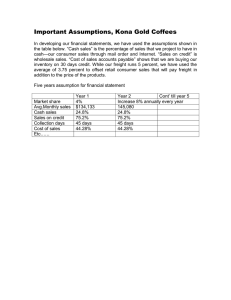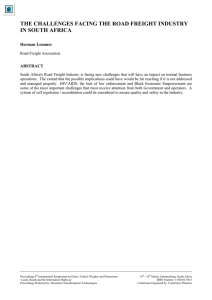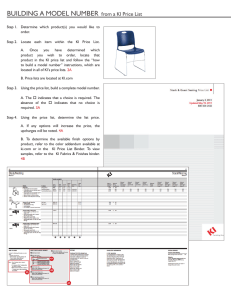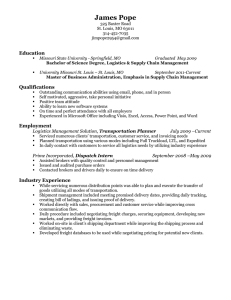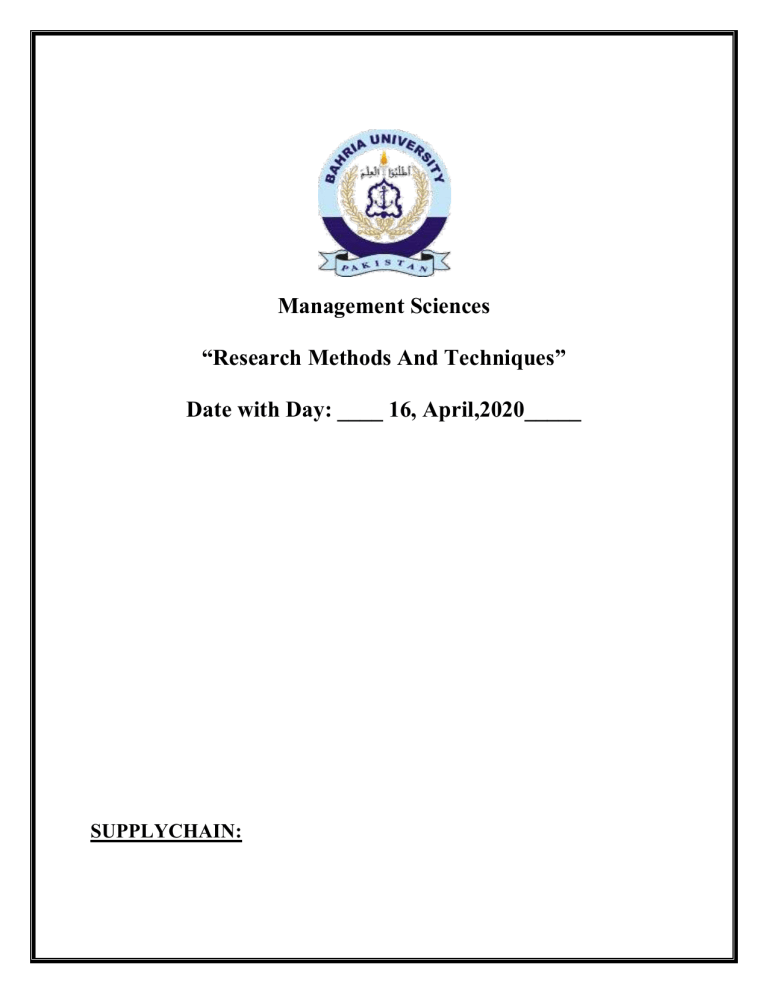
Management Sciences “Research Methods And Techniques” Date with Day: ____ 16, April,2020_____ SUPPLYCHAIN: A supply chain is the network of all the individuals, organizations, resources, activities and technology involved in the creation and sale of a product, from the delivery of source materials from the supplier to the manufacturer, through to its eventual delivery to the end user. FACTORS OF SUPPLYCHAIN: 1) 2) 3) 4) 5) Communication Transportation Planning and analysis Inventory management Management TRANSPORTATION: Transportation the movement of goods and persons from place to place and the various means by which such movement is accomplished. The growth of the ability—and the need—to transport large quantities of goods or numbers of people over long distances at high speeds in comfort and safety has been an index of civilization and in particular of technological progress. FACTORS OF TRANSPORTATION: 1) 2) 3) 4) 5) 6) 7) 8) Fuel costs The labor market for commercial drivers Demand for freight Customer loyalty Vehicle capacity Government regulation Geopolitical events Your reputation as a merchant TITLE OF THE ARTICLE 1) STUDYING DEMAND FOR FREIGHT FORWARDING SERVICES IN UKRAINE ON THE BASE OF LOGISTICS PORTALS DATA 2) SUSTAINABLE URBAN FREIGHT SYSTEMS AND FREIGHT DEMAND MANAGEMENT 3) FREIGHT DEMAND GENERATION ON COMMODITY AND LOADING UNIT LEVEL 4) MODELLING AND ANALYSIS OF SUSTAINABLE FREIGHT TRANSPORTATION NAME OF YEAR OF RESEARCH TARGET AUTHOR ARTICLE METHODOLOGY POPULATION RESULT/ RECOMMENDATION , Vitalii Naumov and Oksana Kholeva 2017 Quantitative and qualitative research Ukrainian transport market According to the results the numeric parameters of the demand could be used as the bases of the simulations of the request flow in solving the problems of increasing the efficiency of freight forwarding services. Jose Holguin versa Ivan sanchez diaz Micheal browne 2016 Quantitative research Metropolitan areas in US. , FDM may hold the key to new paradigms of urban freight systems that improve economic productivity and efficiency; and enhance environmental sustainability, quality of life, and environmental justice. Achieving this lofty goal is worth the effort Koen Mommens1 Tom van Lier2 Cathy Macharis3 2017 Quantitative and qualitative method Industry sector This paper presents how disaggregated freight flows can be generated – based on the knowledge and the limitations in freight generation modelling. Akhilesh Kumar, Martina Calzavara, Nagendra R Velaga, Alok Choudhary & Ravi Shankar 2019 Qualitative research Published papers from the past 3 decades in the area of sustainable freight transportation. This special issue focused on modelling and analysis of sustainable freight transportation to address various issues such as vehicle routing, intermodal transportation, reverse logistics, and green supply chains. 5) THE IMPACT OF THE FREIGHT Shuling TRANSPORT Chen 1 , MODAL SHIFT Jianhong POLICY ON Wu 2,* and CHINA’S CARBON Yueqi EMISSIONS Zong REDUCTION 2020 Quantitative and qualitative research transportation sector , the article finds that road transport is the most energy consuming and most polluting mode among various modes of transport, and the railway transport has the lowest energy consumption and the least carbon emissions. DEMAND FOR FREIGHT Freight transport demand is defined as the amount of inland tonne-kilometres travelled every year in the EEA-33. According to the latest metadata, inland freight transport includes transport by road, rail, inland waterway, air and maritime. INDEPENDENT VARIABLE: Sustainable freight system DEPENDENT VARIABLE: Supply management TITLE OF RESEARCH: The impact of sustainable freight system on supply management. INDEPENDENT VARIABLE: Sustainable freight system INDICATORS: -Mode -Infrastructure -Operations DEPENDENT VARIABLE: Supply Management. INDICATORS: -Perfect order management -cash to cash cycle time -customer order cycle time -fill rate -supply chain cycle time -inventory days of supply -freight bill accuracy -freight cost per unit -inventory turnover -day sales outstanding -average payment period for production material -on time shipping rate -inventory turnover ration - turn earn index -gross margin return on investment -days of supply -inventory velocity PROBLEM STATEMENT . Based on the previous discussion the specific problem statement of the proposed study: "To examine the causal relationship between the sustainable freight system and supply management in Logistics and freight sector of Pakistan" It is also argued Sustainable freight system effects mode of Delivery and Infrastructure of the organization leads to achieve supply management through increase in perfect order measurement and Fill rate. RESEARCH OBJECTIVES: ☆ The first objective of research is to identify the relationship between sustainable freight system and supply management in logistics and freight sector of Pakistan. ☆The second objective of the proposed study is to identify the relation between perfect order measurement, fill rate through mode of delivery and infrastructure in logistics and freight sector of Pakistan. ☆The third objective of the proposed study is to comparison between different service quality providers ( TCS, M&P, DHL and Leopard) in logistics and freight sector of Pakistan. ☆The fourth objective of the proposed study is to develop a framework that provides practical guidelines to the Logistics and freight sector of Pakistan. RESEARCH QUESTIONS 1) What is the impact of sustainable freight system on supply management? 2) How does sustainable freight system influences supply chain management? 3) How does supply management (perfect order measurement, fill rate) measure through mode of delivery and infrastructure in logistics and freight sector of Pakistan? 4) How do the proposed frameworks will be generalized in logistics and freight sector of Pakistan? CONCLUSION: I have worked on this project to know how sustainable freight system impact the supply management and to find out the answers to the research questions that have been mentioned above.
